
Geoenergy Science and Engineering
Scope & Guideline
Advancing Innovations in Energy and Engineering
Introduction
Aims and Scopes
- Geomechanics and Reservoir Engineering:
Research in this area explores the mechanical behavior of geological formations under stress, including the stability of wells, reservoir characterization, and the impact of hydraulic fracturing on rock properties. - Enhanced Oil Recovery (EOR) Techniques:
The journal publishes studies on various EOR methods, including CO2 injection, thermal recovery, and chemical flooding, aimed at improving oil recovery from existing reservoirs. - Geothermal Energy and CO2 Sequestration:
This area focuses on the exploration and exploitation of geothermal resources, as well as the methods for safely sequestering CO2 in geological formations to mitigate climate change. - Fluid Dynamics in Geological Systems:
Research on the flow of fluids within porous media, including the interactions between gas, oil, and water phases, and the effects of fluid properties on reservoir performance. - Nanotechnology and Material Science Applications:
Innovative applications of nanomaterials in drilling fluids, cementing, and enhanced recovery processes, contributing to improved performance and environmental sustainability. - Machine Learning and Data-Driven Approaches:
Studies that leverage machine learning techniques for predictive modeling, data analysis, and optimization of exploration and production processes. - Environmental and Sustainability Studies:
Research addressing the environmental impact of geoenergy practices, including waste management, pollution control, and sustainable resource utilization.
Trending and Emerging
- Carbon Capture, Utilization, and Storage (CCUS):
Research related to CCUS technologies is experiencing significant growth, driven by the urgent need to mitigate climate change and reduce greenhouse gas emissions through innovative storage and utilization methods. - Advanced Computational Modeling and Simulation:
There is increasing interest in utilizing advanced computational techniques, including machine learning and artificial intelligence, to enhance modeling capabilities in reservoir characterization and prediction. - Sustainable and Green Drilling Technologies:
Emerging studies focus on the development of environmentally friendly drilling fluids and techniques that minimize the ecological footprint of drilling operations. - Integrated Geoscience and Engineering Approaches:
Research that combines geosciences with engineering practices is on the rise, promoting interdisciplinary collaboration to address complex geoenergy challenges. - Thermal and Mechanical Coupling in Reservoirs:
The study of thermal and mechanical interactions within reservoirs, especially in geothermal energy extraction and enhanced oil recovery, is gaining prominence. - Nanotechnology Applications in Energy Systems:
The use of nanomaterials in drilling fluids and reservoir management is increasingly prevalent, as researchers explore their potential to enhance performance and efficiency. - Digital Rock Physics and Imaging Techniques:
Advancements in imaging technologies and digital rock physics are leading to more detailed analyses of reservoir properties, driving innovation in characterization methods.
Declining or Waning
- Traditional Hydrocarbon Exploration Techniques:
As the focus shifts towards more sustainable energy sources and advanced extraction methods, traditional exploration techniques for hydrocarbons are becoming less emphasized in recent studies. - Conventional Reservoir Simulation Models:
There has been a noticeable decline in the publication of studies centered around conventional reservoir simulation methods, as researchers increasingly adopt more sophisticated, data-driven approaches. - Basic Geoscience Studies Without Engineering Applications:
Research that solely focuses on geological studies without direct applications in engineering or energy solutions is becoming less frequent, as interdisciplinary approaches gain traction. - Low-Temperature and Low-Pressure Reservoir Studies:
Research focusing on low-temperature and low-pressure conditions in reservoirs has diminished, with a trend towards studies emphasizing high-pressure and high-temperature scenarios.
Similar Journals

SPE RESERVOIR EVALUATION & ENGINEERING
Transforming Geology and Engineering with Peer-Reviewed KnowledgeSPE RESERVOIR EVALUATION & ENGINEERING, published by the Society of Petroleum Engineers, is a leading academic journal that plays a pivotal role in the fields of energy engineering and geology. With a notable Q2 ranking in Energy Engineering, Fuel Technology, and Energy (Miscellaneous), as well as a Q1 ranking in Geology, this journal is recognized for its high-quality, peer-reviewed research contributions that enhance our understanding of reservoir evaluation and engineering practices. Since its inception in 1999, the journal has aimed to disseminate innovative techniques and methodologies applicable to both academia and industry. Available in both print (ISSN: 1094-6470) and online (E-ISSN: 1930-0212) formats, it ensures wide accessibility to its content even as it embraces Open Access options for select titles. Researchers, professionals, and students alike can benefit from the rich repository of technical papers, case studies, and reviews, all designed to advance knowledge and applications in the ever-evolving energy sector.

ROCK MECHANICS AND ROCK ENGINEERING
Driving Progress in Earth Sciences and Engineering PracticesROCK MECHANICS AND ROCK ENGINEERING, published by SPRINGER WIEN, stands as a premier journal in the fields of civil and structural engineering, geology, and geotechnical engineering. Since its inception in 1983, this journal has evolved into a leading platform for the dissemination of high-quality research, underscored by its impressive Q1 quartile rankings in multiple relevant categories as of 2023. With a significant impact factor and a ranking of 8th out of 321 in Earth and Planetary Sciences (Geology), the journal attracts scholars and practitioners aiming to contribute to and stay abreast of advancements in rock mechanics and engineering practices. While it does not offer Open Access options, its comprehensive and rigorous peer-reviewed articles serve as essential resources for fostering knowledge and innovation in the sector. The commitment to exploring the interactions between geological materials and engineering applications makes this journal indispensable for researchers, professionals, and students dedicated to pushing the boundaries of these critical fields.
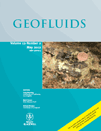
GEOFLUIDS
Unlocking the Secrets of Fluid Dynamics in NatureGEOFLUIDS, published by WILEY-HINDAWI, is an esteemed open-access journal dedicated to advancing the field of Earth and Planetary Sciences since its inception in 2001. With an ISSN of 1468-8115 and E-ISSN 1468-8123, the journal has become increasingly accessible, allowing for broader dissemination of research findings since adopting an open-access model in 2017. The journal has established itself within the academic community, achieving a Scopus rank of #86 in the domain of General Earth and Planetary Sciences, placing it in the 56th percentile, and garnering a Q3 category classification as of 2023. GEOFLUIDS serves as a platform for interdisciplinary exchange of ideas and findings—encouraging contributions that explore fluid dynamics in geological systems and their implications for natural resources and environmental management. Researchers, professionals, and students alike are invited to contribute to and engage with the latest research in this growing field, further enhancing the journal's role in shaping the future of Earth science research.
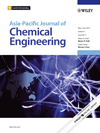
Asia-Pacific Journal of Chemical Engineering
Shaping Tomorrow's Innovations in the Asia-Pacific Region.The Asia-Pacific Journal of Chemical Engineering, published by WILEY, serves as a vital forum for the dissemination of innovative research in the interdisciplinary domains of chemical engineering, renewable energy, sustainability, and waste management. Established in 2006, this esteemed journal has achieved a notable impact factor that reflects its commitment to advancing knowledge and practices within the chemical engineering community. With its Q3 category rankings across various fields, including Chemical Engineering (Miscellaneous), Renewable Energy, Sustainability and the Environment, and Waste Management and Disposal, the journal holds a significant position among its peers, assuring readers of quality and relevance in published content. Although it does not offer Open Access options, the Asia-Pacific Journal of Chemical Engineering remains an essential resource for researchers, professionals, and students aiming to stay at the forefront of innovations affecting the Asia-Pacific region and beyond. The journal's broad scope covers diverse topics, making it an integral part of the academic landscape from 2006 to 2024.
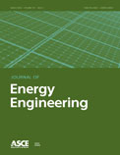
JOURNAL OF ENERGY ENGINEERING
Driving Research in Energy Systems and SustainabilityJOURNAL OF ENERGY ENGINEERING, published by the ASCE-Amer Soc Civil Engineers, serves as a pivotal resource in the fields of civil and structural engineering, energy engineering, and nuclear energy research. With an ISSN of 0733-9402 and an E-ISSN of 1943-7897, this esteemed journal demonstrates a consistent commitment to advancing knowledge in energy systems, sustainability, and waste management. Ranking within the second quartile in several categories—including Civil and Structural Engineering and Energy Engineering and Power Technology—this journal maintains a strong reputation, underscored by its Scopus rankings that place it in the top tiers of its discipline. Accessible from 1982 through 2024, the journal provides researchers and professionals meaningful insights through rigorously peer-reviewed articles, critical reviews, and case studies that address contemporary challenges in energy utilization and infrastructure development. Without open access options, it ensures the integrity and credibility of published work, showcasing influential research that contributes to sustainable solutions in energy and environmental frameworks. Researchers, professionals, and students alike will find the JOURNAL OF ENERGY ENGINEERING an indispensable platform for exploration and dissemination of innovative ideas within the realm of energy and engineering.
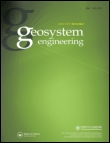
Geosystem Engineering
Shaping policies through impactful geosystem research.Geosystem Engineering, published by Taylor & Francis Ltd, is a prominent academic journal focusing on the interdisciplinary fields of Environmental Engineering, Pollution, and Waste Management and Disposal. With an ISSN of 1226-9328 and an E-ISSN of 2166-3394, this journal has been a significant contributor to the scholarly discussions since its inception in 1998 and continues to publish impactful research up to 2024. As a recognized journal within the Q3 category for its respective fields as of 2023, it serves as a vital platform for researchers, professionals, and students aiming to disseminate findings, share innovations, and address pressing environmental challenges. Although it does not currently offer Open Access options, Geosystem Engineering remains essential for those invested in advancing sustainable practices and technologies in geosystems. The journal delivers critical insights that contribute to the development of policies and practices aimed at improving environmental quality and waste management strategies globally.
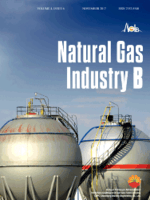
Natural Gas Industry B
Exploring innovations in energy and geology.Natural Gas Industry B is a premier peer-reviewed journal dedicated to the exploration and advancement of knowledge in the field of natural gas and its allied industries. Published by KEAI PUBLISHING LTD in the Netherlands, this open-access journal has been a vital resource for researchers and industry professionals since its inception in 2014. With an impressive categorization in Q1 and Q2 quartiles across diverse areas such as Geology, Energy Engineering, and Modeling and Simulation, the journal's impact is underscored by its strong Scopus rankings--including a percentile rank of 83rd in Geology. Natural Gas Industry B provides a platform for insightful research that addresses the myriad challenges and innovations within the natural gas sector, fostering a deeper understanding of both technical and environmental perspectives. As an open-access journal, it ensures that groundbreaking research is readily available to the global academic community, supporting the dissemination of knowledge and catalyzing collaboration among students, researchers, and professional engineers.
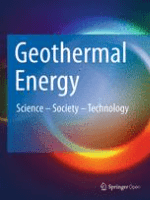
Geothermal Energy
Exploring the depths of geothermal science for a sustainable tomorrow.Geothermal Energy, an esteemed journal published by SPRINGER, stands at the forefront of research in the fields of Economic Geology, Geotechnical Engineering, and Renewable Energy. With an impressive impact factor and a Q2 category ranking in multiple fields as of 2023, it signifies high-quality research and dissemination in its domain. As an Open Access journal since 2013, Geothermal Energy fosters a broad dissemination of knowledge, ensuring that groundbreaking studies are easily accessible to researchers, industry professionals, and students worldwide. The journal aims to address pressing challenges related to geothermal resources, focusing on innovative methodologies, sustainability practices, and emerging technologies from 2013 to 2024. With its dedicated focus on advancing geothermal energy initiatives, it plays a vital role in contributing to the dialogue on renewable energy solutions and environmental sustainability. Nestled in the United States, this journal not only pushes the boundaries of scientific inquiry but also strengthens the global discourse on energy and the environment.

CT&F-Ciencia Tecnologia y Futuro
Pioneering research for a sustainable future.CT&F-Ciencia Tecnologia y Futuro, a distinguished open-access journal published by ECOPETROL SA, serves as a vital platform for the dissemination of innovative research and advancements in the fields of chemical engineering, energy, fuel technology, and the broader disciplines within the geosciences. Established in 1996 and operating continuously until 2023, this bilingual journal aims to foster collaboration and knowledge exchange among researchers, professionals, and students in Colombia and beyond. With an increasing emphasis on sustainability and renewable energy, CT&F aligns with contemporary academic priorities and societal challenges. Although currently ranked in the Q4 category across multiple disciplines, the journal remains committed to enhancing its impact and accessibility, providing researchers with valuable insights and a significant forum to share their findings, all under the auspices of open-access since 2009. Explore a wealth of research as you contribute to the ongoing dialogue shaping the future of science and technology.
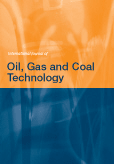
International Journal of Oil Gas and Coal Technology
Pioneering Research for a Sustainable Energy LandscapeWelcome to the International Journal of Oil Gas and Coal Technology, a key platform for research and innovation in the energy sector, published by INDERSCIENCE ENTERPRISES LTD. With an ISSN of 1753-3309 and an E-ISSN of 1753-3317, this journal has been serving the academic community since its inception in 2008, continuing through to 2024. Located in the heart of Geneva, Switzerland, this journal focuses on the essential fields of oil, gas, and coal technologies, addressing cutting-edge developments and challenges in energy production and sustainability. Although currently categorized in the fourth quartile in Energy (Miscellaneous) and holding a Scopus rank in the 26th percentile, the journal aims to enhance its visibility and impact through rigorous peer-reviewed research articles, critical reviews, and insightful case studies that are accessible to the global academic community. Researchers, professionals, and students alike will find valuable insights and advancements in energy technology that contribute to a sustainable future.